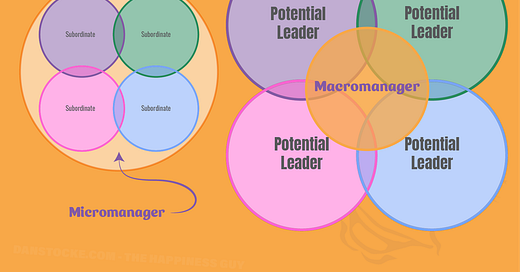Micromanaging Is Megastupid
If you have to be up in everyone’s business without letting them go on their own, no one is working to their highest potential.
If you are currently a micromanager, knock it off.
When you micromanage you aren’t building efficiencies and increasing output as a manager should. You are inhibiting your subordinate’s natural skills to be resourceful while at the same time spreading yourself too thin to be effective.. The math simply doesn’t work out. If you have to be up in everyone’s business without letting them go on their own, no one is working to their highest potential.
Micromanaging costs more in effort (as much as 2x) for a nominal gain in output. If you have subordinates, their job is to do their job. If you are also doing their job, what’s the point of hiring them for the job? It’s maddening!
Micromanager: a superior who, for whatever reason, feels compelled to control every part, however small, of a subordinate's activity.
The goal of being a leader is to maximize the human potential of those you lead. It is to get the very best out of everyone - to whatever level their “best” is. You need to show them what they are capable of and guide them to that level of success. There is a lot of letting go that needs to happen, and it can feel… out of control.
Too bad. Fight the urge to grab the wheel. You’re not Jesus. You’re a leader.
BE A MACROMANAGER
A macromanager is the opposite of a micromanager. By helping your subordinates maximize their potential, output is increased exponentially and you, as the leader, are left to do the job you were meant to do: lead.
Macromanagement vs Micromangement
Macromanagement is giving individuals freedom to think for themselves. Letting go allows your subordinates to push themselves to their own limits and discover new and surprising ways to solve problems and achieve objectives. And they will. There is magic in the space between the desired outcome and allowing someone to figure it out for themselves.
Macromanager: a superior who, for whatever reason, feels compelled to assist a subordinate to such a degree that the subordinate is capable of maintaining quality performance without supervision.
As a leader you have to use the tools at your disposal to the best of your ability. The tools you have are the people you work with. You need to use them like an artist creating beauty with paint and brush, not like a monkey picking its nose with a stick.
Praise (don’t criticize)
Compliments highlight what people are doing right and minimize what is being done wrong. Criticisms emphasize what people are doing wrong but fail at explaining what is being done right. Praise pulls people in the direction you want them to go. Criticism pushes people away from where you don’t want them to go, but offers no direction.
Assist (don’t impede)
People will always need some help. As a leader your job is to be available to get people past a hump or learn a process they are unfamiliar with. They should feel comfortable telling you that they are having a problem because they know you will assist them with their issues. The worst thing to do is castigate a subordinate for hitting a roadblock; 1) because they will never ask you again, and 2) because the roadblock is still in the way.
Guide (don’t fluster)
If you don’t tell people what you want, they will never get there and become flustered, resentful, and disheartened. People need a clear, communicated plan. One with milestones to celebrate that all build to a desired objective. Expectations need to be explicit and achievable. Keeping people on task with the target always in the crosshairs is a way to ensure your subordinates don’t get distracted by minutiae and the unimportant.
Encourage (don’t demoralize)
Having a cheerleader is powerful. An employee who knows their boss is truly excited about their success is motivation of the highest magnitude. It fosters an environment of curiosity and exploration. When mistakes are viewed simply as learning experiences, then the fear of screwing up diminishes to nothing but a risk calculation. You will find the more people are allowed to fuck up, the less they actually fuck up.
LEADERS LEAD (SO LEAD)
When you lead, your real job is to create more leaders, but creating more leaders is a subconscious conflict of your own interest. Somewhere deep down in your brain you think that creating more leaders will weaken your standing as a leader yourself. That invokes the law of diminishing returns. If everyone were to try to keep others from improving, no one would improve and things would turn to shit (again, micromanaging sucks).
The best part of leadership is showing others how to be the best version of themselves, how to work with others so they can be better, and knowing when it is time for them to step up they won’t become another micromanaging jerkoff, but will joyfully jump into the role of creating even more and better leaders.
If you’re going to lead, lead.







I swear I've had multiple managers micromanage just for one reason: They didn't know what else they were supposed to be doing. Thinking strategically, figuring out our long term goals, focusing on the big projects, and all that super important stuff was perhaps too overwhelming to them (or they didn't know how to approach it?) so instead, micromanaging became their default. Ugh.
Both Patrick and Dan pinpointed what the core issue is: managing people requires skills that most managers have never learned/developed. People get promoted but typically have no real training or mentoring. And their direct reports suffer.